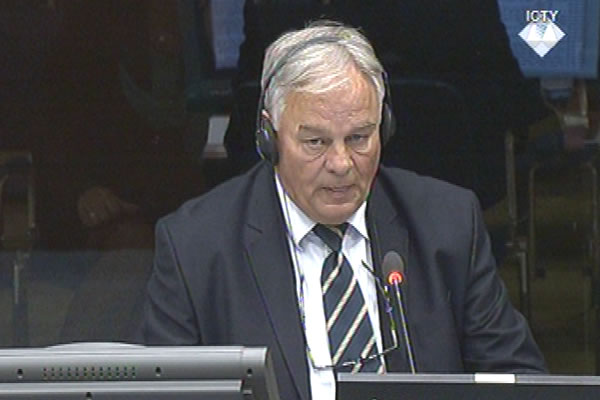Home
SERBS SEIZED POWER TO KEEP PEACE
In his evidence in Ratko Mladic’s defense, a former VRS soldier from Prijedor has described how calls to the Muslims to surrender weapons in the spring of 1992 weren’t ethnically motivated. On the contrary, according to the witness, it was an attempt to ‘keep the peace’ in the municipality. The witness has also claimed that Keraterm and Trnopolje were not prison camps
 Drasko Vujic, defence witness at Rako Mladic trial
Drasko Vujic, defence witness at Rako Mladic trial In 1992, Drasko Vujic commanded a unit of about 900 to 1,200 men from the Prijedor neighborhood of Urije. The unit was part of the JNA 343rd Brigade, and later became the VRS 43rd Brigade. The witness and his unit were in the Prijedor area when the war broke out, but later they were sent to other battlefields from time to time. Last year, Vujic testified in Radovan Karadzic’s defense and his testimony was admitted into evidence at Ratko Mladic’s trial today. The former commander of the VRS Main Staff faces the same charges as Karadzic and is indicted for genocide and other crimes in the war in BH.
In his statement, Vujic says that the Muslim forces attacked Prijedor on 30 May 1992 but his unit was able to repel the attack. As the witness noted, before the ‘clashes and searches’ he had been involved in talks with the members of the Muslim Territorial Defense with a view to persuading them to lay down their arms to ‘keep the peace’. All that happened a ‘month or a month and a half before the Muslim attack’, Vujic specified in reply to a judge’s question. Today the judges often took part in the examination of the witness.
Even as the negotiations were going on, ethnic Serbs seized power in the municipality of Prijedor. After that, there was a call-up. It was necessary to place all the conscripts under a single command, the witness explained. In Vujic’s words, the calls to the Muslims to lay down their arms were not ethnically motivated. They were sent out to all those who failed to respond to the call-up and yet they kept the weapons issued by the Territorial Defense.
When Judge Moloto asked if the Serb members of the Territorial Defense were also supposed to surrender their weapons, Vujic said that ’90 per cent of the Serb Territorial Defense were already assimilated into the war unit’ under his command.
The prosecutor began Drasko Vujic’s cross-examination with a series of questions pertaining to the events in Prijedor at the time of the ‘negotiations with Muslims to surrender the weapons’. The witness confirmed that he knew about the Serbs’ takeover of Prijedor on 29 April 1992. Vujic knew that many civilian properties were destroyed in the attack by his unit against Kozarac and Hambarine and that many ‘non-Serbs were detained and taken to prison camps’. Vujic didn’t agree that Keraterm and Trnopolje could be called prison camps. According to him, Keraterm was just a ‘detention unit’, where prisoners were held while they were being checked. Trnopolje was a ‘reception center’ where people would ‘come when they wanted’, to seek shelter. They left their villages where there was fighting, the witness stressed.
Vujic claimed he was unaware of the killings. He could only surmise that those people were killed in ‘fierce combat operations’: there had to be many casualties. According to Vujic, the Omarska prison camp was established later and the police, not the army, arrested people and brought them there.
Drasko Vujic will continue his testimony on Monday.
